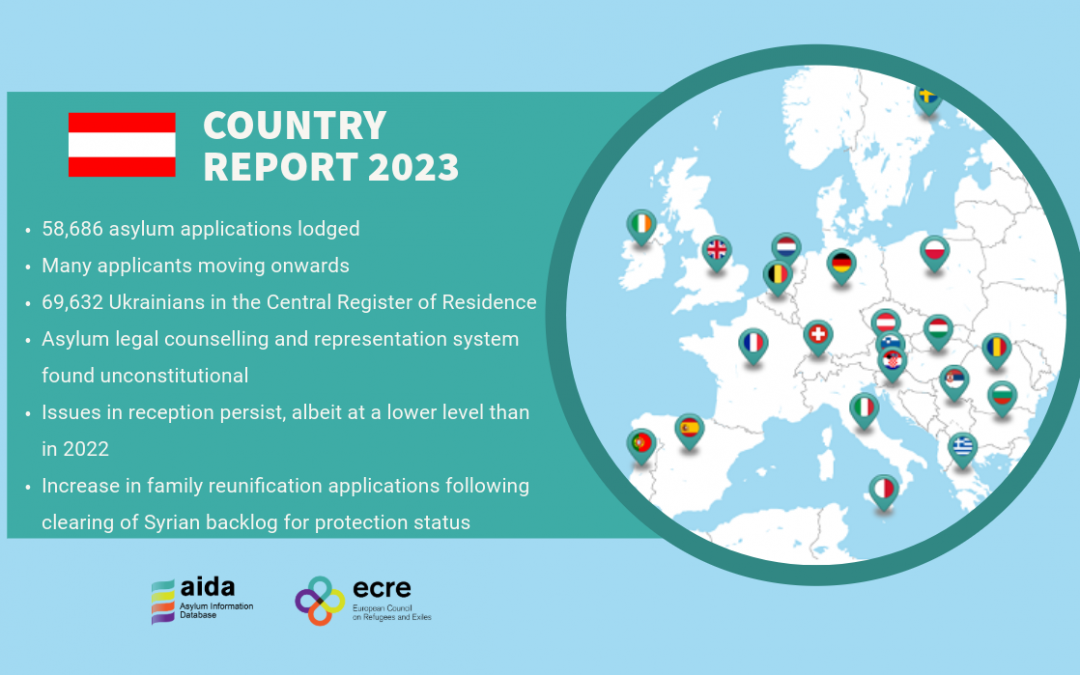The updated AIDA Country Report on Austria provides a detailed overview of legislative and practice-related developments in asylum procedures, reception conditions, detention of asylum seekers and content of international protection in 2023. It also includes an annex which provides an overview of temporary protection (TP).
In 2023, 58,686 international protection applications were lodged in Austria. This represented an almost 50% decrease from 2022 (Austria’s record year). One third of the applicants in 2023 were from Syria and 15% were from Afghanistan. At the same time, almost 30,000 cases were discontinued due to the onward travel of applicants to other countries. Of the 70,000 decisions taken at first instance in 2023, 43% were formal decisions in cases of people having moved onwards after having lodged their applications. The number of overturned cases upon first appeal decreased slightly but remained very high, with over 40% of challenged decisions being overturned by the Court of First Instance.
As of January 2024, approximately 70,000 Ukrainians who had entered Austria since the start of the full-scale invasion of Ukraine in February 2022 were registered in Austria’s Central Register of Residence. Registration was quicker in 2023 due to the low number of arrivals compared to the previous year. Strategic litigation regarding the scope of TP as applied by Austria, notably to third country national partners and people with permanent residence in Ukraine, is ongoing. In spring 2024, a bill was introduced into parliament which enabled Ukrainians who were registered as TP beneficiaries to change to a regular title of stay if they fulfilled certain – quite restrictive – conditions (i.e. having worked for at least 12 months within the last two years, having a sufficient and realistic prospect of income, and having A1 German language skills).
The drop in asylum registrations was also linked to a change in migratory routes due to both a heavy military presence in Serbia and a controversial joint police operation with Hungary. Although there were no reports of pushbacks by Austrian officials on Austrian territory, allegations were made in relation to the joint police operation with Hungary where there were more than 100,000 apprehensions in 2023 but only 28 asylum applications. This was coupled with reports from people on the move who claimed that they had been pushed back to Serbia from Hungary despite having tried to apply for asylum. As a result of the decrease in the number of registrations, the temporary altered registration system in Burgenland was discontinued and regular registration resumed in the same way as in the rest of the country.
The debated system of legal counselling and representation, which had been introduced in 2021, was deemed unconstitutional by the Constitutional Court in December 2023. The Court found that the independence of the legal counselling, which was provided by the state-owned Federal Agency for Reception and Support Services (BBU GmbH), was not guaranteed by the existing legal framework. It ruled that unless there was a change in the law by the end of June 2025, legal counselling and representation would no longer be entrusted to the BBU GmbH.
The drop in asylum applications also partly relieved the pressure on Austria’s reception system. Several locations were either permanently or temporarily closed in the final quarter of 2023. However, the lack of co-operation between the federal basic care system, which is responsible for asylum applicants during the admissibility phase, and the provinces, which are responsible during the rest of the procedure, persisted and, as a result, some asylum applicants stayed in federal facilities for longer than necessary. Some provinces created additional smaller facilities after the 2022 reception crisis.
Finally, there was a sharp increase in applications for asylum via the family reunification process in 2023, as the authorities worked on a backlog of Syrian protection cases. As a result, following positive asylum decisions (excluding formal decisions, the protection rate for Syrians was 99% in 2023), many families filed applications for entry authorisations. More than 14,000 applications for family reunification were introduced in 2023, leading to 9,180 asylum applications. More than 95% of the applicants were from Syria and 70% of them were minors.
The full report is available here and the annex on temporary protection is available here.
For more information about the AIDA database or to read other AIDA reports, please visit the AIDA website.

